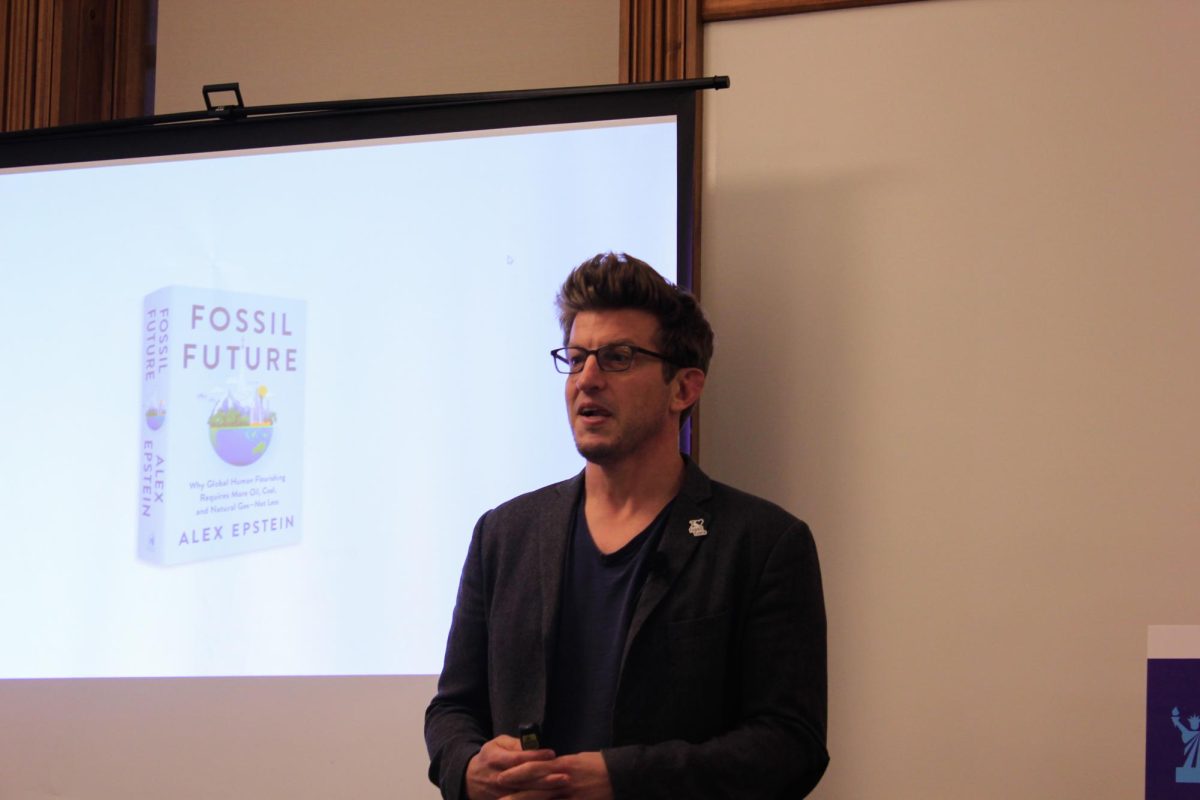Alex Epstein shared his version of the appropriate reaction to climate change in the Illini Union on Tuesday. Epstein, a graduate of Duke University with a bachelor’s degree in philosophy, is an advocate for fossil fuel expansion and the author of “The Moral Case for Fossil Fuels and Fossil Future.” The event was made possible through the Young America’s Foundation and the Academy on Capitalism and Limited Government Foundation.
The correct response to climate change has risen to the pinnacle of political debate and public worry. As a result, commitments like the Paris Agreement have emerged as a shared plan across nearly all United Nations countries to curb climate change through the reduction of emissions.
As for individual ideologies, consensus is less common. Epstein shared his views with University and community members offering a different perspective that hails from his background in philosophy.
“Nobody ever has a problem and says ‘Let’s call a philosopher,’” Epstein said. He noted that he believes that his background in philosophy has enabled him to see global warming in a way that formally taught climate scientists can not.
“Climate science turns out to be a minor aspect in this issue,” Epstein said. “Scientists share thoughts and they share facts, but I don’t think most people think about how to think about it. You don’t need to go to university; anyone can develop expertise on anything.”
Get The Daily Illini in your inbox!
Epstein’s argument is that contrary to popular opinion, fossil fuels’ benefits outweigh their negative effects and should be harnessed more than ever to combat climate change consequences. In the long run, Epstein is interested in nuclear energy’s potential.
“I think that we should be using more fossil fuels, not forever, but for the near future,” Epstein said. “I’m arguably the biggest advocate in the world for nuclear, but if we do it wrong right now, it delays progress. If we get rid of fossil fuels right now, I think it’ll ruin the world.”
Max Rizzo, graduate student studying physics, harbored skepticism about the speaker’s legitimacy, especially when speaking on such impactful topics.
“He doesn’t have any scientific credentials in the field of climate science,” Rizzo said. “He doesn’t participate in the field.”
Despite this, Epstein held to his methodology and believes that commitments toward net zero emissions are detrimental to society and that fossil fuels’ cruciality is not being considered.
“I think it’s one of the most destructive ideas humans have ever come up with,” Epstein said about mainstream solutions. “They don’t talk about the unique benefits of fossil fuels, so we’re going to make mistakes.”
In Epstein’s eyes, governments have already made these mistakes in the form of subsidiaries toward alternative energy sources.
“We, as taxpayers, get taxed a bunch of money to keep solar wind companies afloat,” Epstein said. “They provide electricity whenever the sun shines or the wind blows. Solar and wind can go near zero at any given time.”
Much of the talk was spent discussing the cost-effectiveness of fossil fuels, with Epstein describing the incomparable affordability and efficiency of the natural resource. He continued to describe more benefits that he claimed to have never heard of before doing his own research.
“Fossil fuels are crucial to food in a way that we have no near-term replacement,” Epstein said. “Geniuses figured out how to use natural gas — which is quite abundant — to create synthetic fertilizer and power mechanized agriculture.”
Gillen Wood, professor in LAS and associate director at the Institute for Sustainability, Energy and Environment, expressed an opposing viewpoint.
“The changes in precipitation can’t be predicted,” Wood said. “Growing corn is impossible if there are a certain number of days in the summer above 95 degrees (which causes) deep systemic changes in our food systems.”
However, Epstein claims to have an answer for all the negative effects of increased production of emissions.
“Fossil fuels help us master climate,” Epstein said. “Even if we made drought more common in some places, the level of mastery is so great it doesn’t really matter. Our climate mastery is much greater than our climate challenges. As long as that’s here, it doesn’t really matter how much we change the climate.”
He used air conditioning and irrigation as examples of society’s ability to tame the global climate and bring relief to those affected by its consequences.
However, Epstein believes there may be an overreaction surrounding the consequences and that the effects of climate change will taper off.
“There’s no real plausible argument that warming is going to be some huge threat; additional CO2 leads to less warming,” Epstein said while referencing a graph relating the rise in global temperature to CO2 emissions. “CO2 levels will rise, and life will get better and better.”
Despite claims that CO2 leads to less warming, Epstein explained why warming shouldn’t be looked at as a bad thing.
“More warming means fewer deaths from cold,” Epstein said. “The warming is concentrated in colder places; you generally want to be warmer where people are super cold.”
Wood, along with the majority of climate scientists, has found firm footing in the belief that warming is certainly, at a minimum, a threat.
“We’re already in the age of consequences as it has to do with carbon waste in the atmosphere,” Wood said. “Developing countries in South and East Asia are coming up against a critical sort of livability.”
Wood strongly believes that an argument for fossil fuels lacks consideration for future generations making it unethical and immoral.
“Epstein’s ethical universe is the world of the present and the near future,” Wood said. “Halting the transition will delay the benefits to a point where we’re beyond two degrees or even three degrees of warming, at which point civilization begins to really suffer.”
Despite how it looks, there are overlaps of ideology between Epstein and the climate science majority. Wood acknowledges they can agree on the value of fossil fuels and the fear associated with leaving them behind.
“It has never simply been about the waste … it’s about what it has enabled us to do,” Wood said. “Why would we ever give it up? It’s scary to contemplate, but morally cowardly not to.”
Bill Kline, who handles programming and stakeholder relations for the Academy on Capitalism and Limited Government, said the talk provided provocative and insightful information.
“It is a learning opportunity,” Kline said. “There are legitimate discussions to be had about the externalities, but I thought he did a fair job of bringing things to the table to consider.”
But for others like Rizzo, Epstein’s lack of accreditation, among other things, made it difficult to accept his findings.
“The title of the event, ‘A Moral Case for Fossil Fuels,’ was shocking,” Rizzo said. “It seems very obvious that he’s largely a propagandist. Science is tedious. You publish a paper and it’s more than likely that no one will read it. What’s easy is being a propagandist — worrying about participation and audience reception instead of scientific accuracy.”
Epstein concluded his thoughts by considering the actions of China and their reasoning for excessive fossil fuel production.
“Why does China have so many coal plants in the pipeline?” Epstein said. “Because fossil fuels are uniquely cost-effective. This energy freedom allows for innovation for alternative energy sources.”
Where Epstein looks to China, Wood advises against their examples.
“In North America, the emissions have flattened or even decreased since the ’90s,” Wood said. “These efforts are more than offset by Asia. Our efforts here (in the U.S.) have almost no effect. The planetary outcome will depend on what happens in Asia.”
When all is said and done, both thinkers wish for the best future, but with different ways of getting there.
“I think we inherited an imperfect climate that’s imperative to master,” Epstein concluded. “If we go to net zero, billions of lives will be ruined.”
With the shared sentiment of saving lives in mind, Wood signs off with his strategy.
“To offset the most serious impacts for the middle of the century we should be on a kind of war footing,” Wood concluded.










